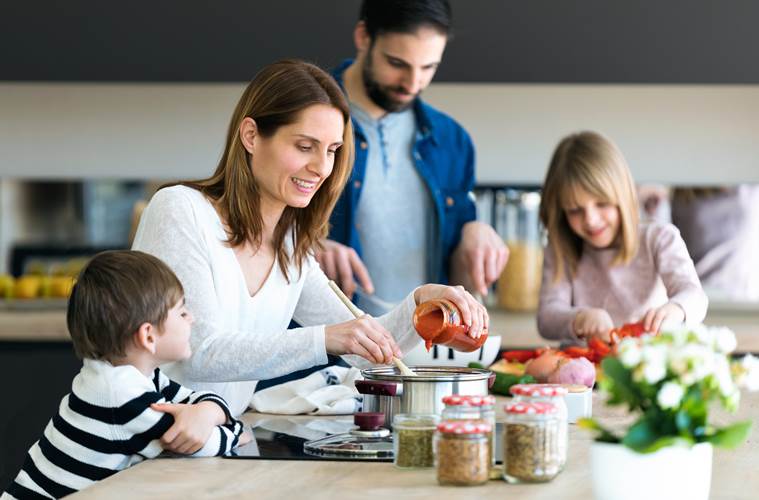How the adults behave will be exactly what the children of the house emulate. A little kindness towards each other will go a long way.

By Sapna Khajuria
The past few weeks have given us all a chance to step back and recalibrate our priorities, and look at our lives with a fresh perspective. There is more than enough information on how to keep your children busy during the lockdown phase, but I have been thinking of what I hoped my children could learn from the current pandemic situation. Yes, studies have been interrupted and children are cooped up inside their homes, but surely there are lessons they can learn that go beyond the traditional concepts of a formal education – there’s so much more to education than literacy. There is much to learn even in this difficult situation- social responsibility, resilience, compassion, and kindness, to name a few.
Social responsibility: Right now, the best form of social responsibility to teach our children is to wash their hands thoroughly, and to maintain social distancing. This is an opportune time to tell them how simple acts like washing their hands, staying home, and helping those in need can save lives. Also the flipside, of risks posed by not doing so, that means the risks posed by being a covidiot. The best way to ensure they learn? Lead by example – stay home, tell them what happens when certain people go overboard in hoarding groceries and supplies, show them videos of the medical fraternity going above and beyond for patients, news about acts of kindness like the volunteers providing food for the helpless labourers who left Delhi after the lockdown was announced, or communities collecting food and essentials to make sure no one in their neighbourhood goes hungry.
Dispel myths — just use plainspeak: Right now, we are dealing with a covid information overload – it is natural to remark upon that message you just received on your college WhatsApp group. But you know what — children have superhuman hearing (except of course when parents want them to complete a chore) – they listen and absorb a lot more than we parents realise. Don’t trust every forwarded message or every link you receive. Instead, discuss scientific facts connected to the pandemic, tailoring them according to the age of your children; and talk to them about the dangers of believing unverified information.
Indulge in some caremongering: Hands down the nicest trend to have emerged in these times, this initiative that started in Toronto to help out the vulnerable has ignited a spark everywhere. There are Facebook groups with thousands helping out by bringing groceries to the elderly, all over the world, including the Caremongers India group on Facebook initiated by Ms Mahati Nataraj. I have friends who are helping senior citizens who live alone. Our condominium has an initiative run by its Club 60 team, with residents volunteering to be in regular contact with senior residents, checking if they are in good spirits, or to bring them essentials. Get your child to help with something like this, or helping prepare a cleanliness kit with bars of soap and sanitisers for your help’s family, etc. Better still, ask your children how they would like to help – they may come up with ideas straight from the heart.
Be role models for gender positivity at home: Dads and moms, this is your chance to shape your child’s mind. The chores at home are unending. On many forums, I have been reading about women taking on most, if not all of the household chores. Divide up the work – as fairly as you can- between the two of you, and be role models for gender positivity.
Life skills
Whether it is us parents who don’t assign enough daily chores to children, or the fact that their daily routine is super busy, it is a fact that while most children may ace their academics and extra-curriculars, they aren’t exactly champs when it comes to life-skills. Many adults today have lived a cushy childhood and ended up being clueless about basic life skills – how to cook, to do basic repairs, or even handle their finances. There are actual “adulting classes” for young adults to learn life skills like cooking, sewing, time management, budgeting etc. Don’t let your child join the list of young adults who crib about how hard “adulting” is.
One of my teenagers loves cooking – he has mastered the art of making perfect rotis, and manages to bake simple stuff too. I plan to ensure both my boys are able to rustle up a simple meal (not something out of a tin / packet) before the new school term begins. For sons and daughters, this is a survival skill that is absolutely essential. Excuse the mess they may make in the beginning, and if you are a control freak like me, please resist the urge to say “move aside, just let me handle it”. Depending on their age, they should be able to use appliances like the oven, microwave, washing machine etc.; and know how to chop vegetables and prepare a basic meal. From vacuuming the house to using the washing machine to handling money, segregating garbage, assign tasks every day. Aside from the life skills bit, this is bound to make them feel gratitude for those who make our lives simpler – our domestic help.
If you have pets and have not already made your children responsible for looking after the pet, this would be a great time to start – let them help with grooming the pet, toilet training for younger pets, exercising the pet inside the house. Side effects guaranteed – zero stress, mood uplift, happy vibes.

Dealing with the epidemic of misinformation: There is a covid misinformation overload around us. People are forwarding every single WhatsApp message they receive literally the second they receive it, without so much as a glance at the contents. It is crucial to talk to our children about fake news and the larger impact it can have. Remember all those pictures of dolphins in the canals of Venice? National Geographic recently posted an article debunking that and other similar stories. Or the photos of deer that were supposedly chilling out on the road to Ooty, but were in fact, pictures taken in Nara, Japan. There is dangerous information online and on social media in the name of cures for coronavirus, and it is very important to speak to children about the importance of distinguishing fact from fiction, and cross-checking information before sharing it further.
Talk about inequality: Don’t just talk of the latest WhatsApp forward / news report on the covid situation – use the emerging economic situation to explain concepts like recession, loans, economic disparities to younger children. Talk to older children about how a crisis like the current pandemic theoretically affects everyone the same, but the economically and socially vulnerable sections are the ones that are worst affected. Speaking to children about the heart wrenching migration of labourers in the wake of the lockdown, for instance; and about the very real threat to smaller businesses because of the pandemic.
Stress management, dealing with failure: There is enough literature on the theoretical aspect, but it’s important for your child to hear from you about your failures. Perhaps more important than it is for them to know of, and be inspired by your success stories. Instead of reminding your child how much more hard working/diligent/respectful/whatever else you were when you were their age, how about talking to them about the time you struggled with a subject in school, or dealt with bullying, or that one project at work that was not the big success you hoped it would be. With hormones playing havoc, a changing world, let’s not add trying to live up to one’s parents’ giant successes to a teenager’s burden.
Read | Coronavirus: Talk facts on maths, science and more with kids
Resilience
For a generation not quite used to hearing the word “no”, and having an overdose of choices, tough times like these can help build resilience. Slowly, with the new structure and routine at home, you can help them realise that instant gratification isn’t always possible – because markets are shut, that toy or game that they wanted right away will unfortunately take much longer to arrive. Simple things like ecommerce entities prioritising orders of groceries and cancelling other orders can open their eyes to the realities of life that are taken for granted. Explain to them why there is a shortage of groceries and supplies. Let them help you cook a meal that you rustle up using whatever limited ingredients you have lying around. Talk to them about how they are more privileged than others, and don’t get to face tough tests of adversity.
Kindness to the earth
Has there been a more stark example of how all of us on earth are connected, sharing the same resources, and facing the same enemy? The sad truth about this pandemic is that loss of animals’ habitats leads to diseases spilling over into human communities. Chances are, your child already feels passionately about climate change – this is a chance to speak to your child about the science behind zoonotic diseases, and connect this to facts about climate change. Do they expect that the world will go back to treating nature with the same lack of care, and can they help change things? Is the current state of clean air something we can aspire to even in the post Covid days? Younger children can start with small steps like waste segregation, and a more careful use of resources.
The difference between need and want
This one’s for us adults too. Pretty early in my spring cleaning efforts, I realised just how much we tend to accumulate, whether it is stationery for children or items bought online on impulse. So far, we are managing very well with the limited items of food we have at home, and we can definitely manage without a lot of other possessions. This one the children will learn if they see us practising mindful purchasing. I’m not saying you go all Marie Kondo inspired “does this spark joy” for everything you possess, but this situation is definitely going to teach us how to live happily with less.
Leading by example
This situation of working from home for what might turn out to be an indefinite period of time is a new ballgame for most families. Children who are already forced to stay cooped up, especially younger ones, may find it difficult to accept what they see as more restrictions on them. Frankly, in the beginning, everyone may just be winging it, taking each day as it comes, and that’s perfectly alright. Tempers may be frayed with everyone stepping on the others’ space. How the adults behave will be exactly what the children of the house emulate. A little kindness towards each other will go a long way.
The author Michael Morpurgo recently wrote that, with the cooperation he sees around, with people learning to appreciate others, he is convinced that the post-covid world will be a much kinder one. Amen to that.
? The Indian Express is now on Telegram. Click here to join our channel (@indianexpress) and stay updated with the latest headlines
For all the latest Parenting News, download Indian Express App.
Source: Read Full Article



